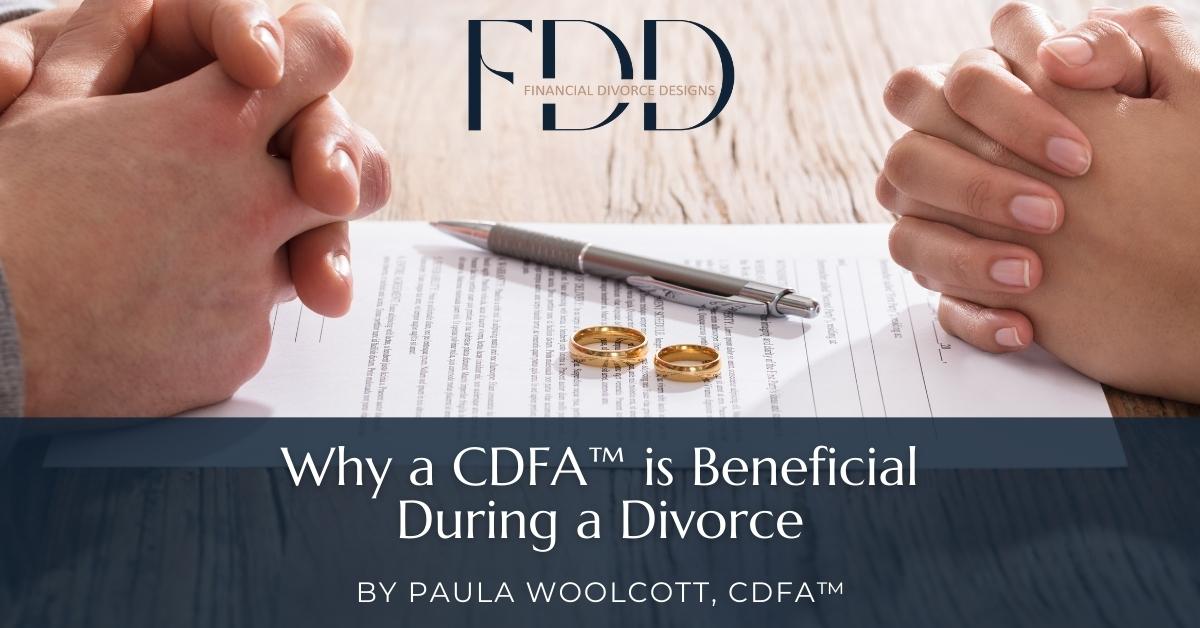
Why a CDFA™ is Beneficial During a Divorce
When a couple chooses to end their marriage, there are many decisions that need to be made. Disagreements over finances are common in divorces. Couples that disagreed about finances during their marriage will most likely continue to disagree during the divorce process. Working with a CDFA™ (Certified Divorce Financial Analyst™) can help resolve financial issues that arise during a divorce.
What Does a CDFA™ Do?
Most people that are divorcing know to hire a lawyer to assist in the process. Many lawyers are not well-versed in the financial details in dividing assets. They are trained in the legal aspects of a divorce, but not the financial ones. That is why some spouses who are divorcing seek the help of a professional who is trained in the financial considerations of divorce. A CDFA™ can be a financial, legal, or accounting professional that has undergone this type of training.
Hiring a CDFA™
A CDFA™ can work just for you to inform you of the best financial decisions you can make or can advise both parties on the financial issues of the divorce. A CDFA™ can lend his or her expertise to better negotiate finances. In this way, both parties will be made aware of the financial issues that occur during and after the divorce.
Dividing Assets
During a divorce, the couple must divide their property and possessions. This is not necessarily an equal split, but rather a fair or equitable settlement. Each party should think about the assets that will help their long-term financial security. You may want to keep your shared home so that your children maintain a feeling of stability. However, this might not be in your interest from a financial perspective. A CDFA™ professional will work through the implications of asset division scenarios that can help you avoid financial mistakes.
What Income Will You Need?
Those people who are going through a divorce need to understand their financial situation. Most people must change their lifestyle after they get a divorce because the income must now be divided among two households. You may be eligible for support from your spouse depending on how long you were married. If you have children, you might also get child support.
A budget is useful in controlling spending now that the financial situation has changed. A CDFA™ will assist in creating a post-divorce budget that will take into account your living expenses, financial commitments, and costs for your children. The CDFA™ will explain how to understand how much you are able to spend with a detailed budget, so you do not underestimate or overestimate how much you need to live on a weekly or monthly basis.
What About Insurance?
Although sometimes overlooked, insurance should be part of your divorce settlement. Insuring against risks is essential to you and your family’s financial health. For example, a divorce settlement may require one spouse carries a life insurance policy with the other as the beneficiary. If the spouse passes, the life insurance death benefit will take the place of alimony or child support.
Disability insurance is also important because if it is more likely to become disabled than to die early. Disability insurance can be provided by your employer or a private insurance policy. If you receive alimony or child support, your divorce settlement should include that your spouse carries disability coverage. If your health insurance is through your spouse’s job, you may no longer be able to be dependent depending on the law in your state and the health plan. In this case, you will want to have a plan in place once the divorce is final. Navigating insurance issues can be done by a CDFA™ expert who can review what type of coverage you will need.
What About Retirement?
If you are years away from retirement, it might not be in the forefront of your mind during your divorce. The decisions you make during the divorce negotiations can affect your financial future, including retirement. If your spouse has a pension, you might not be sure about how to take a payout as your share of the sum. A CDFA™ can weight the short-term and long-term effects of how to deal with retirement funds.
The CDFA™ can also explain the tax consequences of taking taxable assets instead of retirement assets during negotiations. The advantages of tax-deferred growth might be beneficial depending on how far away you are from retirement. Planning for retirement during your divorce can ensure financial security in the future.
A CDFA™ professional can guide you through the financial issues surrounding your divorce. He or she can determine how to best negotiate so you do not make a financial mistake during this difficult time.
Take Control of Your Future
When you consider divorce, or if you know someone who is contemplating divorce, one of the biggest realities for those in the divorce process is the financial settlement and financial analysis post-divorce. Get the assistance of Paula Woolcott, CDFA™ at Financial Divorce Designs.
We will provide step-by-step guidance on matters related to divorce. With a wide range of experience and expertise related to divorce issues, Paula will simplify the process and provide much-needed clarity in areas such as long-term tax consequences, asset, and debt analysis, dividing pension plans, continued health care coverage, stock option elections, protecting support with life insurance, and much more.
Schedule Your Complimentary Consultation Today!




